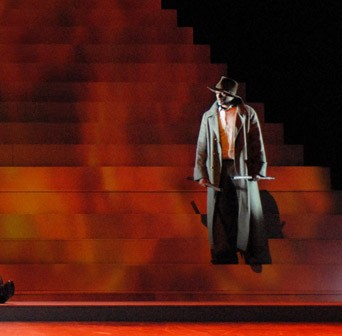Live from Aix 2009: The Twilight of the Gods

This article is the last in a series of three pieces on the 2009 Aix festival. Read the other two pieces in our Culture section.
With three powerhouse Swedish sopranos in major roles and more sturm und drang than any single opera should rightfully contain, Götterdämmerung—The Twilight of the Gods—is the final installment of the Aix festival’s ambitious four-year presentation of Richard Wagner’s Ring of the Niebelung. It’s a six-hour marathon, full of vocal fireworks, and certainly the best of the four segments, all staged by French director Stéphane Braunschweig, with Sir Simon Rattle conducting the Berlin Philharmonic orchestra.
In his libretto for the Ring cycle, Wagner cavalierly threw together the Old Norse gods of Valhalla, warrior Valkyries and water nymph Rhine maidens with medieval legends of chivalrous knights and magic dragons-as if King Arthur and Lancelot had to contend with Jupiter, Venus and Mars. It makes for a hefty lot of characters and confusion, but the key element is the ring, made of gold stolen from the Rhine and a curse on all who possess it until it is returned to the Rhine. In last year’s third installment, Siegfried, the title character braved a flaming cordon to reach the exiled Valkyrie Brünnhilde, and married her, plighting his troth with the ring, which he won by slaying a giant.
Now, leaving Brünnhilde at home asleep, Siegfried sets off on a knightly quest that takes him to the castle of the Gibich-Gunther, his sister Gutrune and their half-brother, the conniving Hagen, who concocts a plot to marry Gunther to Brünnhilde and Gutrune to Siegfried, with the help of a magic potion that makes Siegfried forget Brünnhilde and fall in love with Gutrune. But the betrayed Brünnhilde extracts revenge by conspiring with Hagen, leading to a tragic, all-too-human end as the power of the gods declines.
A nearly-ideal Wagnerian tenor, Canadian Ben Heppner this year takes up where he left off as Siegfried, singing impeccably but offering an odd portrayal of the naive and fearless knight-at first in hunting gear like a beer-bellied country bumpkin, and later, looking trimmer in a dark suit, but still grimacing like a cartoon simpleton.
Among the leading ladies, soprano Emma Vetter offers an imposing and well-sung Gutrune; renowned mezzo-soprano Anne Sophie von Otter is impressive as the Valkyrie Waltraute, a role that might easily have been too big for her lovely voice; and soprano Katarina Dalayman, returning as Brünnhilde, carries the whole long show with astonishing vocal beauty and strength. Puffing on a big cigar, Russian bass Mikhail Petrenko is a scene-stealer as the villainous Hagen; and the deep, rich voice of bass-baritone Gerd Grochowski makes the outsmarted aristocrat Gunther remarkably sympathetic. It’s a terrific cast, outshined only by the Berliner Philharmoniker orchestra itself, which here confirms its reputation as possibly the world’s best.
By the time Wagner wrote this last segment of the Ring cycle, in the early 1870s, he was under the patronage of Louis II of Bavaria, highly successful and supremely sure of his own genius. He was totally free to make his Ring as long and power-packed as he pleased, and it was played in full-the four episodes total some 14 hours-for the first time in 1876, at the opening of his monument to himself, his own theater and festival in Bayreuth. Although the idea is heretical, Götterdämmerung might be even better after a bit of editing.
On at the Grand Théâtre de Provence in Aix-en-Provence through July 12, the production will be performed again at the Salzburg Easter Festival in 2010.
This article is the last in a series of three pieces on the 2009 Aix festival. Read the other two pieces in our Culture section.
Share to: Facebook Twitter LinkedIn Email
Leave a reply
Your email address will not be published. Required fields are marked *



